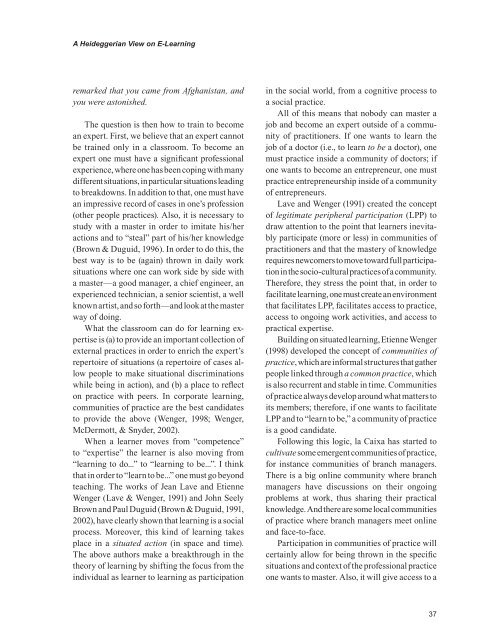Advances in E-learning-Experiences and Methodologies
You also want an ePaper? Increase the reach of your titles
YUMPU automatically turns print PDFs into web optimized ePapers that Google loves.
A Heideggerian View on E-Learn<strong>in</strong>g<br />
remarked that you came from Afghanistan, <strong>and</strong><br />
you were astonished.<br />
The question is then how to tra<strong>in</strong> to become<br />
an expert. First, we believe that an expert cannot<br />
be tra<strong>in</strong>ed only <strong>in</strong> a classroom. To become an<br />
expert one must have a significant professional<br />
experience, where one has been cop<strong>in</strong>g with many<br />
different situations, <strong>in</strong> particular situations lead<strong>in</strong>g<br />
to breakdowns. In addition to that, one must have<br />
an impressive record of cases <strong>in</strong> one’s profession<br />
(other people practices). Also, it is necessary to<br />
study with a master <strong>in</strong> order to imitate his/her<br />
actions <strong>and</strong> to “steal” part of his/her knowledge<br />
(Brown & Duguid, 1996). In order to do this, the<br />
best way is to be (aga<strong>in</strong>) thrown <strong>in</strong> daily work<br />
situations where one can work side by side with<br />
a master—a good manager, a chief eng<strong>in</strong>eer, an<br />
experienced technician, a senior scientist, a well<br />
known artist, <strong>and</strong> so forth—<strong>and</strong> look at the master<br />
way of do<strong>in</strong>g.<br />
What the classroom can do for learn<strong>in</strong>g expertise<br />
is (a) to provide an important collection of<br />
external practices <strong>in</strong> order to enrich the expert’s<br />
repertoire of situations (a repertoire of cases allow<br />
people to make situational discrim<strong>in</strong>ations<br />
while be<strong>in</strong>g <strong>in</strong> action), <strong>and</strong> (b) a place to reflect<br />
on practice with peers. In corporate learn<strong>in</strong>g,<br />
communities of practice are the best c<strong>and</strong>idates<br />
to provide the above (Wenger, 1998; Wenger,<br />
McDermott, & Snyder, 2002).<br />
When a learner moves from “competence”<br />
to “expertise” the learner is also mov<strong>in</strong>g from<br />
“learn<strong>in</strong>g to do...” to “learn<strong>in</strong>g to be...”. I th<strong>in</strong>k<br />
that <strong>in</strong> order to “learn to be...” one must go beyond<br />
teach<strong>in</strong>g. The works of Jean Lave <strong>and</strong> Etienne<br />
Wenger (Lave & Wenger, 1991) <strong>and</strong> John Seely<br />
Brown <strong>and</strong> Paul Duguid (Brown & Duguid, 1991,<br />
2002), have clearly shown that learn<strong>in</strong>g is a social<br />
process. Moreover, this k<strong>in</strong>d of learn<strong>in</strong>g takes<br />
place <strong>in</strong> a situated action (<strong>in</strong> space <strong>and</strong> time).<br />
The above authors make a breakthrough <strong>in</strong> the<br />
theory of learn<strong>in</strong>g by shift<strong>in</strong>g the focus from the<br />
<strong>in</strong>dividual as learner to learn<strong>in</strong>g as participation<br />
<strong>in</strong> the social world, from a cognitive process to<br />
a social practice.<br />
All of this means that nobody can master a<br />
job <strong>and</strong> become an expert outside of a community<br />
of practitioners. If one wants to learn the<br />
job of a doctor (i.e., to learn to be a doctor), one<br />
must practice <strong>in</strong>side a community of doctors; if<br />
one wants to become an entrepreneur, one must<br />
practice entrepreneurship <strong>in</strong>side of a community<br />
of entrepreneurs.<br />
Lave <strong>and</strong> Wenger (1991) created the concept<br />
of legitimate peripheral participation (LPP) to<br />
draw attention to the po<strong>in</strong>t that learners <strong>in</strong>evitably<br />
participate (more or less) <strong>in</strong> communities of<br />
practitioners <strong>and</strong> that the mastery of knowledge<br />
requires newcomers to move toward full participation<br />
<strong>in</strong> the socio-cultural practices of a community.<br />
Therefore, they stress the po<strong>in</strong>t that, <strong>in</strong> order to<br />
facilitate learn<strong>in</strong>g, one must create an environment<br />
that facilitates LPP, facilitates access to practice,<br />
access to ongo<strong>in</strong>g work activities, <strong>and</strong> access to<br />
practical expertise.<br />
Build<strong>in</strong>g on situated learn<strong>in</strong>g, Etienne Wenger<br />
(1998) developed the concept of communities of<br />
practice, which are <strong>in</strong>formal structures that gather<br />
people l<strong>in</strong>ked through a common practice, which<br />
is also recurrent <strong>and</strong> stable <strong>in</strong> time. Communities<br />
of practice always develop around what matters to<br />
its members; therefore, if one wants to facilitate<br />
LPP <strong>and</strong> to “learn to be,” a community of practice<br />
is a good c<strong>and</strong>idate.<br />
Follow<strong>in</strong>g this logic, la Caixa has started to<br />
cultivate some emergent communities of practice,<br />
for <strong>in</strong>stance communities of branch managers.<br />
There is a big onl<strong>in</strong>e community where branch<br />
managers have discussions on their ongo<strong>in</strong>g<br />
problems at work, thus shar<strong>in</strong>g their practical<br />
knowledge. And there are some local communities<br />
of practice where branch managers meet onl<strong>in</strong>e<br />
<strong>and</strong> face-to-face.<br />
Participation <strong>in</strong> communities of practice will<br />
certa<strong>in</strong>ly allow for be<strong>in</strong>g thrown <strong>in</strong> the specific<br />
situations <strong>and</strong> context of the professional practice<br />
one wants to master. Also, it will give access to a


